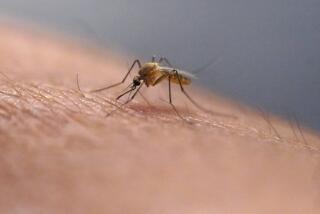Don’t like bug spray? Time to reconsider
- Share via
It’s hard to hide from mosquitoes. Short of staying indoors, the best way to protect against their irritating bites -- and the West Nile virus -- is by applying an insect repellent to your skin. But too few people bother.
Nationwide, only about 40% of people routinely use mosquito repellent, data has shown; in Pacific states, such as California, usage is significantly lower, at 23%. And some of the people most at risk for serious complications from West Nile virus are the ones electing not to use repellents.
“Use is notably lower among people over age 60,” says Emily Zielinski-Gutierrez, a behavioral scientist with the division of vector-borne diseases at the federal Centers for Disease Control and Prevention.
Since the viral infection appeared in this country several years ago, almost 1 million people have been infected. Last year the infection killed 88 people and left 900 with severe neurological disease.
In part, the low rates of repellent use have been attributed to a lack of acceptable choices. Until this year, only one repellent carried the CDC’s endorsement -- N,N-diethyl-3-methylbenzamide, better known as DEET.
Many people worried about DEET’s safety; others simply didn’t like the way it smelled or felt on their skin.
Most experts believe that fears about the repellent are unfounded.
“DEET presents an impressive safety record,” says Zielinski-Gutierrez. Serious problems, such as seizures, associated with its use are rare and typically result from long-term, excessive or inappropriate use.
In fact, even the American Academy of Pediatrics has stated that it is safe for children in concentrations up to 30%. (It is not, however, recommended for infants younger than 2 months of age.)
Still, many people prefer “natural” repellents to ones like DEET. One such product, oil of lemon eucalyptus -- a plant-based repellent -- has been on the market for several years but only recently received the CDC’s seal of approval.
“Oil of lemon eucalyptus can perform really well for moderate amounts of time outdoors,” says Zielinski-Gutierrez. In several recent studies, the oil performed as well as low concentrations of DEET products.
Being “natural,” however, does not guarantee a product’s safety. Compared with DEET, data on oil of lemon eucalyptus are relatively scarce.
Because it has not yet been extensively tested in young children, the oil is not currently approved for children younger than 3.
The CDC has also endorsed picaridin, a repellent that has been used for several years in many parts of the world, including Europe, Australia and Asia, but that is entering the U.S. market for the first time this year.
Studies have found it to be as effective as DEET, and some people say that, because it’s odorless, it is more pleasant to use.
Public health experts hope that the availability of effective newer products such as picaridin and oil of lemon eucalyptus will encourage people to use repellents more regularly.
But they worry about the complacent attitudes toward mosquitoes, particularly in areas such as Southern California, where people don’t see a lot of them.
“Many people haven’t felt that mosquitoes are a major health concern,” says Zielinski-Gutierrez.
But the threat of West Nile virus is ubiquitous -- and predicting outbreaks is difficult. Cases of West Nile virus have been reported in every state in the continental U.S. except Washington.
In fact, in 2004 more cases were reported in California than in any other state in the country.
“The risk changes every year,” says Zielinski-Gutierrez. “We don’t know where the hot spots are going to be.”
For this reason, the CDC recommends that everyone use repellent when they’re going to spend time outside during prime mosquito biting hours, between dusk and dawn. (In some areas, local health authorities actually encourage people to stay indoors during these times.)
Although mosquitoes seem to use a variety of signals to detect their targets, experts believe that human scents are the most important cues. Effective repellents form a barrier on the skin and interfere with a mosquito’s ability to smell you.
So if you don’t use a mosquito repellent this summer, be forewarned: The mosquitoes will probably find you.
*
(BEGIN TEXT OF INFOBOX)
How to safely use repellent
Regardless of whether they’re “natural” or “artificial,” repellents have the potential to cause side effects. Exposure to even small amounts can cause skin irritation in people sensitive to them; in very high doses, more serious problems can occur.
Here’s how to get the greatest protection from repellents with the lowest risk of side effects:
* Apply repellent to all exposed areas of skin; unprotected skin very close to a treated area can be attacked by mosquitoes. (Do not use repellent under clothing.)
* Apply sparingly, and reapply according to package label instructions (or sooner if you’re getting bitten).
* Do not allow children to handle repellent. When using repellent on children, do not apply it to their hands.
* To avoid getting repellent in your eyes, never spray it directly onto your face. Apply it to your palms first.
* Do not use repellents over cuts, wounds or irritated skin.
* To avoid ingesting or inhaling it, do not spray repellent in enclosed areas or near food.
* Avoid combination sunscreen-repellent products. Because sunscreens may need to be reapplied more frequently than repellents, using combination products could result in unnecessary repeated application of repellent.
* Wash treated skin with soap and water after returning indoors.
*
Dr. Valerie Ulene is a board- certified specialist in preventive medicine practicing in Los Angeles. She can be reached at themd@att.net.
The M.D. appears the first Monday of the month.




